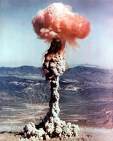Tuesday, October 10, 2006
Hard for Members of Nuclear Club to Urge Non- Proliferation
 When I studied International Politics at university I did a course on disarmament; all those interwar conferences trying vainly to make a distinction between aggressive and defensive weapons. They didn't work. Later, I was never very clear as to what our 'Disarmament Minister', Lord Chalfont, ever achieved in the sixties. Yet we have subsequently had agreements between states which have achieved a modicum of success. There was the Nonproliferation Treaty of 1966 and then the Intermediate-Range Nuclear Forces Treaty of 1987. But since then things have deteriorated, as Dan Plesch notes and life has become much more dangerous.
When I studied International Politics at university I did a course on disarmament; all those interwar conferences trying vainly to make a distinction between aggressive and defensive weapons. They didn't work. Later, I was never very clear as to what our 'Disarmament Minister', Lord Chalfont, ever achieved in the sixties. Yet we have subsequently had agreements between states which have achieved a modicum of success. There was the Nonproliferation Treaty of 1966 and then the Intermediate-Range Nuclear Forces Treaty of 1987. But since then things have deteriorated, as Dan Plesch notes and life has become much more dangerous.Now the nuclear powers are, in descending order of firepower: USA, Russia, China, UK, France, Israel, India, Pakistan, and, since the recent underground test, North Korea(though some scientists in the west question if it really was a genuine test). There can be no doubt that the acquisition on nukes by this 'secretive and atrophied Stalinist relic' as the Guardian's leader describes it, makes the world's survival more parlous. What should we do? As Plesch points out we have rather tied our hands by not wishing to prejudice our chances of acquiring upgraded Trident missiles from the US. So we are fated to support the line set by George Bush, who inspires only a little more confidence than the bouffant haired Kim Jong-il.
How this problem is countered will be complex and delicate and I was not reassured by US Ambassador to the UN, John Bolton's bullish performance on Today this morning- though I was impressed by his powers of argument, which clearly vastly exceed those of his president. With such attitudes from the world's only superpower, the UN's chances of coping seem small and one can only pray that pre-emptive attack is not embraced by the White House as the only course of action. Nor was I impressed by Margaret Beckett's performance on Today yesterday. Humphries asked her how we in Britain could justify urging non nuclear nations to retain this status when we had no intention of giving up our own stockpiles. She fumbled before showing her lack of calibre by resorting to waffle but, alas, there is no satisfactory answer to that question.
Comments:
<< Home
I don't believe there will be a pre-emptive strike on North Korea. The consequences would be too horrific to imagine. A nuclear armed North Korea and proliferation of nuclear weapons are now a fact of life.
By the way you missed France in your list.
By the way you missed France in your list.
The moral dimension was surely the mistake made in the 30's. Disarmament has never been about what is right. Nations have always and will always do what they can. And other nations will always attempt to stop them. It doesn't matter what you think of each of them, nations will be nations.
North Korea will not be allowed to have nuclear capability. Thankfully for the decent people of the world, the USA is there to stop them, and only a fool would underestimate American resolve. I suspect the North Koreans will recognise it and avert the crisis. But they have had enough warnings in any case.
North Korea will not be allowed to have nuclear capability. Thankfully for the decent people of the world, the USA is there to stop them, and only a fool would underestimate American resolve. I suspect the North Koreans will recognise it and avert the crisis. But they have had enough warnings in any case.
In essence this is Hobbes v Kant Skipper and as Michael says it's never been about what's right.
The simple (if uncomfortable) answer to the question of where we get off urging non-proliferation on others while retaining our own stockpiles is that we're a stable & mature leberal democracy - North Korea isn't.
Post a Comment
The simple (if uncomfortable) answer to the question of where we get off urging non-proliferation on others while retaining our own stockpiles is that we're a stable & mature leberal democracy - North Korea isn't.
<< Home





